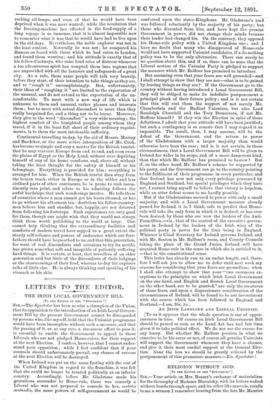LETTERS TO THE EDITOR.
THE IRISH LOCAL GOVERNMENT BILL.
[To THE EDITOR OF THE " SPECTATOR ”] SIR,—The Spectator has been so wise a champion of the Union, that its opposition to the introduction of an Irish Local Govern- ment Bill by the present Government cannot be disregarded by persons who, like myself, hold that the Unionist programme would have been incomplete without such a measure, and that the passing of it, or, at any rate, a strenuous effort to pass it, is essential to enable the Government to appeal to those Liberals who are not pledged Home-rulers, for their support at the next Election. I confess, however, that I cannot under- stand your opposition ; while I feel confident that if your counsels should unfortunately prevail, any chance of success at the next Election will be destroyed.
When Ireland was put on the same footing with the rest of the United Kingdom in regard to the franchise, it was felt that she could no longer be treated politically as an inferior country. Accordingly, before Mr. Gladstone made his gratuitous surrender to Home-rule, there was scarcely a Liberal who was not prepared to concede to her, inutaiis mutandis, the same powers of self-government as would be conferred upon the sister-Kingdoms. Mr. Gladstone's lead_ was followed reluctantly by the majority of his party ; but• those, who dissented from him, and have kept the present Government in power, did not change their minds because their leader had changed his. On the contrary, they opposed his Home-rule policy with a United Kingdom one ; and I have no doubt that many who disapproved of Home-rule would not have supported Unionist candidates, if a do-nothing policy was to be the only alternative. There can surely be no question about this, and if so, there can be none that the Liberal section of the Unionist Party is pledged to support, the measure which Mr. Balfour has promised to introduce.
But assuming even that your fears are well grounded—and I shall attempt to show that they are not—what is to be gained_ by leaving things as they are? If the Government go to the- country without having introduced a Local Government Bill, they will. be obliged to make its indefinite postponement a principal plank of their future policy; and is it not certain- that this will cost them the support of not merely Mr. Chamberlain and the Radical Unionists, but also Lord Randolph Churchill and the Tory Democrats, if not Mr. Balfour himself ? If they win the Election in spite of these defections, I admit that your attitude will have been justified ;. but such a contingency is so remote that I may regard it as impossible. The result, then, I may assume, will be the defeat of the Government, and the return to power_ of the Gladitonians with a larger majority than would otherwise have been the case ; and is it not certain, in these circumstances, that a Local Government Bill will be given to Ireland far wider in its scope, and of a more dangerous kind, than that which Mr. Balfour has promised to bestow ? But if, on the other hand, Mr. Balfour's scheme he supported by his party, and the Government can go to the country pointing to the fulfilment of their programme in every particular, and that Ireland has now not only every privilege possessed by England and Scotland, but special privileges which they have . not, I cannot bring myself to believe that victory is hopeless, while an utter defeat seems to me hardly possible.
But if the Gladstonians succeed to power with only a small majority, and with a Local Government measure already passed for Ireland, it is, I think, safe to predict that Home rule will take the only form in which it is desired, or has ever been desired, by those who are now the leaders of the Anti- Parnellites,—viz., that of the control of the executive govern- ment in Ireland by the leaders of the Irish wing of the- political party in power for the time being in England. Whoever is Chief Secretary for Ireland governs Ireland, and with Mr. Sexton in Mr. Balfour's room, and County Councils- taking the place of the Grand Juries, Ireland will have acquired Home-rule in the sense •in which she is entitled to it, —that is, the constitutional sense.
This letter has already run to an undue length, and, there- fore I will ask you to allow me to defer until next week my reasons for considering that your fears are groundless; when I shall also attempt to show that your " two enormous ex- ceptions to the principles on which Irish Local Government on the one hand, and English and Scotch Local Government on the other hand, are to be granted," are only the creatures- of those fears, and upon a dispassionate consideration of the circumstances of Ireland, will be found to be not inconsistent with the course which has been followed in England and Scotland.—I am, Sir, &c.,
AN IRISH LANDLORD AND LIBERAL UNIONIST.
[To us it appears that the whole question is one of oppor- tuneness in time. Of course an Irish Local Government Bill should be passed so soon as the Land Act has had fair time given it to take political effect. We do not see the excuse for- any hurry. But whether Mr. Balfour persists in what we- conceive to be his error or not, of course all genuine Unionists• will support the Government whenever they have a chance, and give it their most cordial support at the General Elec- tion. None the less we should be greatly relieved by the postponement of this premature measure.—ED. Spectator.]


































 Previous page
Previous page